PEN/Penn Your Language My Ear Russian Poetry Translation Project
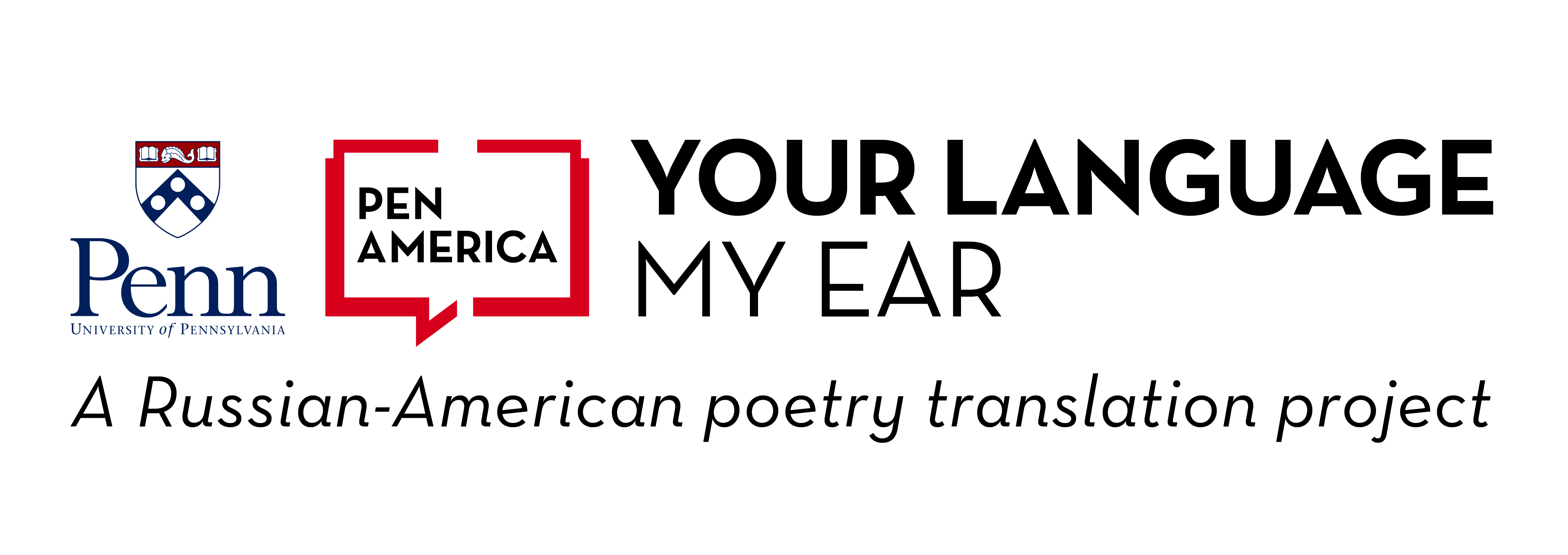
At a time when closing borders and national divisions are steadily decreasing contact between people, cultures and languages, the PEN/PENN Your Language My Ear project is building cultural bridges. Our undertaking seeks to make Russophone voices opposed to war and oppression heard in English, and vice versa, in order to build solidarity among those who speak out and struggle for peace, freedom, and justice across the world.
Through this project, PEN America will partner with the University of Pennsylvania and Columbia University to bring poets and translators working in English and Russian to engage in collective creative work, to educate students and each other about the power of language to resist injustice, and to bring people together to work for a better future.
The first year of the project, taking place in Yerevan with the support of PEN Armenia, is focused on the translation of Russophone poetry into English. The second year will focus on the translation of American poets’ work into Russian. At the end of each cycle, PEN America will coordinate with publishing houses to publish anthologies of the translated works in both languages.
The PEN/Penn Your Language My Ear program represents a continuation and extension of a 2020 pilot project that was part of PEN America’s Writers in Dialogue program. The pilot project paired seven Russian poets with seven U.S. translators who worked on texts in multiple encounters, ultimately leading to the publication of the anthology Verses on the Vanguard: Russian Poetry Today.
Following years of isolation brought about by the global COVID-19 pandemic, in the shadow of horrific violence unleashed by the Russian Federation in Ukraine, the calling of poets and translators to create communities of resistance and hope across all borders is more urgent than ever. The PEN/Penn Your Language My Ear project is in service of that goal, granting Anglophone and Russian-speaking audiences access to voices, many of which are subject to interdiction and censorship in their own countries, creating a space for commonalities of struggle and a future world of peace to emerge.
Participating Poets and Translators
 Ruthie Jenrbekova (Vienna, Austria) was born in Almaty, Kazakhstan, at the time when it was a Soviet Socialist Republic. She graduated from Kazakh State University as an ecologist. Since 1997, she has been involved in various literary, artistic, and curatorial activities. She also works as an interdisciplinary artist/researcher and cultural organizer. Together with Maria Vilkovisky, she is the cofounder of the imaginary art institution krёlex zentre. She writes texts as both theory and poetry. Her fields of interest include performance philosophy, material semiotics, and art-based methodologies. Currently a Ph.D. candidate at the Academy of Fine Arts Vienna, she lives and works in Almaty and Vienna.
Ruthie Jenrbekova (Vienna, Austria) was born in Almaty, Kazakhstan, at the time when it was a Soviet Socialist Republic. She graduated from Kazakh State University as an ecologist. Since 1997, she has been involved in various literary, artistic, and curatorial activities. She also works as an interdisciplinary artist/researcher and cultural organizer. Together with Maria Vilkovisky, she is the cofounder of the imaginary art institution krёlex zentre. She writes texts as both theory and poetry. Her fields of interest include performance philosophy, material semiotics, and art-based methodologies. Currently a Ph.D. candidate at the Academy of Fine Arts Vienna, she lives and works in Almaty and Vienna.
 Konstantin Shavlovsky: Poet, cinema critic, publisher, curator. Creator and executive manager of the intellectual literature bookshop Word Order (Saint Petersburg). As a cinema critic, worked in the editorial office of Seance magazine (2004-2017). Published many books about the history of Russian cinema. As an independent curator, realized several interdisciplinary projects dedicated to the cinema. As a poet, was published in literature magazines New Literary Review, TextOnly, Translit, a collection of queer poetry Under One Cover etc. Author of two books of poetry: Twins In Nettles (Kolonna Publications, 2015) and What should have been told from the very beginning (New Literary Review, 2021).
Konstantin Shavlovsky: Poet, cinema critic, publisher, curator. Creator and executive manager of the intellectual literature bookshop Word Order (Saint Petersburg). As a cinema critic, worked in the editorial office of Seance magazine (2004-2017). Published many books about the history of Russian cinema. As an independent curator, realized several interdisciplinary projects dedicated to the cinema. As a poet, was published in literature magazines New Literary Review, TextOnly, Translit, a collection of queer poetry Under One Cover etc. Author of two books of poetry: Twins In Nettles (Kolonna Publications, 2015) and What should have been told from the very beginning (New Literary Review, 2021).
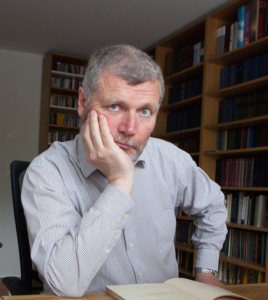 Born in 1958 in Tsarskoye Selo/Pushkin, Leningrad region, Sergey Zavyalov graduated from the Department of Classical Philology at Leningrad University. He was a member of Club 81, an oppositional writers’ organisation in the 1980s, and was published in the magazines of the Leningrad Samizdat. In the 1990s, he taught Latin, Ancient Greek and Classical literature at St. Petersburg universities and gave special courses on the history of unofficial literature at the university. Between 2004 and 2011 he lived in Finland, and from 2011 onwards he has lived in Switzerland, where he gives lecture courses on the history of Soviet poetry at the University of Zurich. He is the author of seven poetry books in Russian, most recently Стихотворения и поэмы 1993-2017. Москва, Новое литературное обозрение (Collected Poems 1993-2017). Moscow: New Literary Observer published several books of essays and has nine books translated into foreign languages. He is the winner of the Andrey Bely Prize (2015) and Premio Ceppo Internazionale Piero Bigongiari (2016).
Born in 1958 in Tsarskoye Selo/Pushkin, Leningrad region, Sergey Zavyalov graduated from the Department of Classical Philology at Leningrad University. He was a member of Club 81, an oppositional writers’ organisation in the 1980s, and was published in the magazines of the Leningrad Samizdat. In the 1990s, he taught Latin, Ancient Greek and Classical literature at St. Petersburg universities and gave special courses on the history of unofficial literature at the university. Between 2004 and 2011 he lived in Finland, and from 2011 onwards he has lived in Switzerland, where he gives lecture courses on the history of Soviet poetry at the University of Zurich. He is the author of seven poetry books in Russian, most recently Стихотворения и поэмы 1993-2017. Москва, Новое литературное обозрение (Collected Poems 1993-2017). Moscow: New Literary Observer published several books of essays and has nine books translated into foreign languages. He is the winner of the Andrey Bely Prize (2015) and Premio Ceppo Internazionale Piero Bigongiari (2016).
 Ramil Niyazov (St. Petersburg, Russia & Almaty, Kazakhstan) is a post-Soviet Uyghur and/or Kazakh of Uyghur origin. He writes poetry, as well as studies contemporary art, post-colonial studies, queer sufism, and the steppe. He is originally from Almaty, but studies at St. Petersburg State University in the Faculty of Liberal Arts and Sciences. He is also a member of krёlex zentre and editor of полутона.
Ramil Niyazov (St. Petersburg, Russia & Almaty, Kazakhstan) is a post-Soviet Uyghur and/or Kazakh of Uyghur origin. He writes poetry, as well as studies contemporary art, post-colonial studies, queer sufism, and the steppe. He is originally from Almaty, but studies at St. Petersburg State University in the Faculty of Liberal Arts and Sciences. He is also a member of krёlex zentre and editor of полутона.
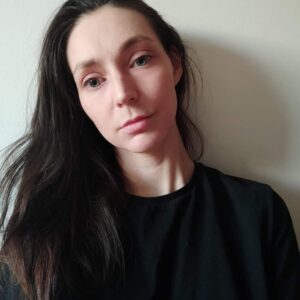 Evgeniya Suslova is a poet and artist. In her practice, she works with the principles of strange communication, making the language space of a thought experiment. Author of poetry books «Свод масштаба» (2013) and «Животное» (2016). Co-founder of publishing house-laboratory “Red Swallow.” Candidate of philological sciences, preparing a dissertation devoted to the study of the language of contemporary poetry. As a researcher, Suslova is developing a theory of poetic connection and writes on language in a media-analytical dimension. Published in «Новое литературное обозрение», «Транслит», «Цирк Олимп», «Соло неба», «Греза» and others. Poetic texts translated into French, German, Spanish, Greek, and Azerbaijani. Graduated from the Rodchenko School of Photography and Multimedia (class: Interactive, communicative and mixed media). As an artist she has done interactive installations and performance art. Artistic works have been displayed in the Vadim Sidur Museum, the Garage museum of contemporary art, the New Space at the Theater of nations, the Bauhaus Dessau Museum, and other venues. She teaches writing at the Rodchenko School, the Moscow School for New Literature, and the British Higher School of Design, and teaches a range of liberal arts courses at Lobachevsky State University of Nizhniy Novgorod National Research University.
Evgeniya Suslova is a poet and artist. In her practice, she works with the principles of strange communication, making the language space of a thought experiment. Author of poetry books «Свод масштаба» (2013) and «Животное» (2016). Co-founder of publishing house-laboratory “Red Swallow.” Candidate of philological sciences, preparing a dissertation devoted to the study of the language of contemporary poetry. As a researcher, Suslova is developing a theory of poetic connection and writes on language in a media-analytical dimension. Published in «Новое литературное обозрение», «Транслит», «Цирк Олимп», «Соло неба», «Греза» and others. Poetic texts translated into French, German, Spanish, Greek, and Azerbaijani. Graduated from the Rodchenko School of Photography and Multimedia (class: Interactive, communicative and mixed media). As an artist she has done interactive installations and performance art. Artistic works have been displayed in the Vadim Sidur Museum, the Garage museum of contemporary art, the New Space at the Theater of nations, the Bauhaus Dessau Museum, and other venues. She teaches writing at the Rodchenko School, the Moscow School for New Literature, and the British Higher School of Design, and teaches a range of liberal arts courses at Lobachevsky State University of Nizhniy Novgorod National Research University.
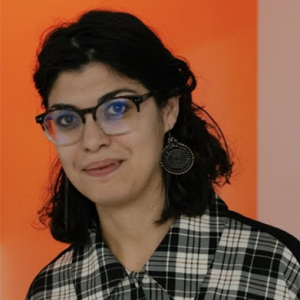
Egana Dzhabbarova (Ekaterinburg, Russia) is a poet and associate professor teaching Russian as a foreign language at the Ural Federal University. She is an organizer of the festival MEZHA and author of the poetry books Bosphorus (2015), Romberg’s Pose (2017), and Red Button Alarm (2020). She is the winner of the 2016 Poetic Debut Award from New Youth magazine. She was also longlisted and shortlisted for the Arkady Dragomoshchenko Award in 2017 and 2019. Her publications have appeared in print and online journals in Russia and Ukraine. Her work is featured in the international anthologies Under One Cover (Kazakhstan) and F-Letter (England). She led a workshop on decolonial writing at Fem Workshop Almaty, supported by the Prince Claus Foundation. Her poems have been translated into English, Polish, German, and Italian.
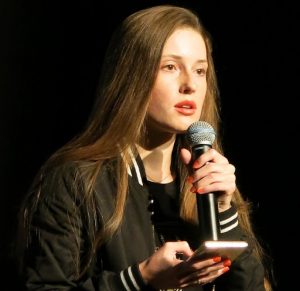 Maria Malinovskaya (Moscow, Russia) is a Belarusian-born poet who writes in Russian. She is Ph.D. student in contemporary poetry studies at the National Academy of Sciences of Belarus and an author of two books. The first one, a documentary poetry project and collection Kaimaniya (2020), is based on authentic speech of people suffering from mental disorders. The second one, The Movement of Hidden Colonies (2020), includes both language and documentary poems. Malinovskaya’s poetry has been published in numerous anthologies and magazines and translated into English, Spanish, Italian, Lithuanian, Ukrainian, Belarusian, and Polish. She is a participant of the European Poetry Festival (United Kingdom, 2019), the Nordic Poetry Festival (Norway, 2019), and The European Camarade (Lithuania, 2019). Malinovskaya’s poem “white-red-white flag,” based on the events around the Belarusian protests, was honored in one of the 2021 Poesia Prize’s main categories for poetry written in Russian language.
Maria Malinovskaya (Moscow, Russia) is a Belarusian-born poet who writes in Russian. She is Ph.D. student in contemporary poetry studies at the National Academy of Sciences of Belarus and an author of two books. The first one, a documentary poetry project and collection Kaimaniya (2020), is based on authentic speech of people suffering from mental disorders. The second one, The Movement of Hidden Colonies (2020), includes both language and documentary poems. Malinovskaya’s poetry has been published in numerous anthologies and magazines and translated into English, Spanish, Italian, Lithuanian, Ukrainian, Belarusian, and Polish. She is a participant of the European Poetry Festival (United Kingdom, 2019), the Nordic Poetry Festival (Norway, 2019), and The European Camarade (Lithuania, 2019). Malinovskaya’s poem “white-red-white flag,” based on the events around the Belarusian protests, was honored in one of the 2021 Poesia Prize’s main categories for poetry written in Russian language.
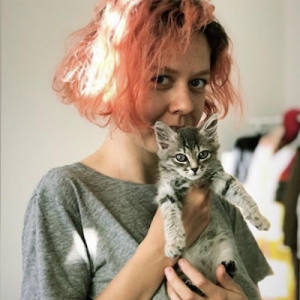 Dinara Rasuleva (Berlin, Germany) is a poetess based in Berlin and born in Kazan, Tatarstan, Russia toward the end of ’80s. For the first six years of her life, Rasuleva spoke only her native Tatar language and now she writes predominantly in Russian, mixing it with Tatar, English, and German—languages she used everyday in Berlin. In Berlin, she started in poetry slams, became a winner twice, started organizing slams and festivals herself. She travels around the world performing mostly for Russian-speaking immigrants. Her poetry was described and analyzed as decolonial and feminist writing, as well as expressionist poetry and performance poetry.
Dinara Rasuleva (Berlin, Germany) is a poetess based in Berlin and born in Kazan, Tatarstan, Russia toward the end of ’80s. For the first six years of her life, Rasuleva spoke only her native Tatar language and now she writes predominantly in Russian, mixing it with Tatar, English, and German—languages she used everyday in Berlin. In Berlin, she started in poetry slams, became a winner twice, started organizing slams and festivals herself. She travels around the world performing mostly for Russian-speaking immigrants. Her poetry was described and analyzed as decolonial and feminist writing, as well as expressionist poetry and performance poetry.
 Igor Gulin (Moscow, Russia) is a writer, critic, and essayist based in Moscow. He works as a cultural reviewer for Kommersant-Weekend. He is also the editor and cofounder of the Nosorog literary magazine and is an independent researcher working in the field of late Soviet culture. His poetry, prose, and articles have appeared in NLO, Translit, Textonly, Colta, and more.
Igor Gulin (Moscow, Russia) is a writer, critic, and essayist based in Moscow. He works as a cultural reviewer for Kommersant-Weekend. He is also the editor and cofounder of the Nosorog literary magazine and is an independent researcher working in the field of late Soviet culture. His poetry, prose, and articles have appeared in NLO, Translit, Textonly, Colta, and more.
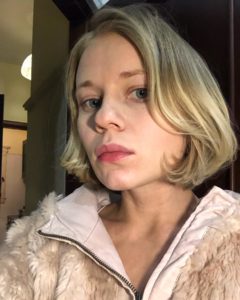 Ekaterina Zakharkiv (Moscow, Russia) is a literary and production editor for F-writing – a platform that publishes texts that engage, problematize or analyze the queer and feminist logic of writing – Syg.ma – a (micro)media platform for contemporary poetry – and GRYOZA. She is the co-founder and Chief Editor of the Almanac Fire, a network portal to the possible worlds of poetry, sound and image. She is also a researcher of modern poetry, a translator, graduate student and junior researcher of the Institute of Linguistics of the Russian Academy of Sciences. Her poems have been translated into English, Spanish, Polish, Latvian and Chinese, and have been published in the magazines NLO, Zerkalo, Nosorog, F-writing, Lana Turner, Punctum and others. She is a laureate of the Arkady Dragomoshchenko Prize (2016), and the author of the book Felicity Conditions (M.: ARGO-RISK, 2017). Her academic articles are devoted to the study of the linguo-pragmatic aspect of modern poetic discourse (magazines Matica srpska, Slovo.ru, NLO, etc.). She has translated the work of anglophone poets such as J. Graham, B. Watten, C. Harryman, and R. Clervaux.
Ekaterina Zakharkiv (Moscow, Russia) is a literary and production editor for F-writing – a platform that publishes texts that engage, problematize or analyze the queer and feminist logic of writing – Syg.ma – a (micro)media platform for contemporary poetry – and GRYOZA. She is the co-founder and Chief Editor of the Almanac Fire, a network portal to the possible worlds of poetry, sound and image. She is also a researcher of modern poetry, a translator, graduate student and junior researcher of the Institute of Linguistics of the Russian Academy of Sciences. Her poems have been translated into English, Spanish, Polish, Latvian and Chinese, and have been published in the magazines NLO, Zerkalo, Nosorog, F-writing, Lana Turner, Punctum and others. She is a laureate of the Arkady Dragomoshchenko Prize (2016), and the author of the book Felicity Conditions (M.: ARGO-RISK, 2017). Her academic articles are devoted to the study of the linguo-pragmatic aspect of modern poetic discourse (magazines Matica srpska, Slovo.ru, NLO, etc.). She has translated the work of anglophone poets such as J. Graham, B. Watten, C. Harryman, and R. Clervaux.
EXPERT GROUP
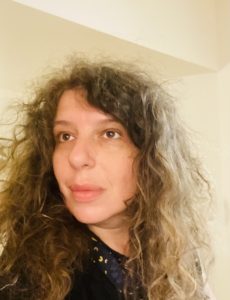 Polina Barskova (Berkeley, California, United States) is a poet, scholar, and author of 12 collections of poems and two books of prose in Russian. She has also authored a monograph Besieged Leningrad: Aesthetic Responses to Urban Disaster (2017) and edited three scholarly volumes. Her collection of creative nonfiction, Living Pictures, received the Andrei Bely Prize in 2015, was published in German with Suhrkamp Verlag, and is forthcoming in English with New York Review Books. She edited the Leningrad Siege poetry anthology Written in the Dark (Ugly Duckling Presse) and has four collections of poetry published in English translation: This Lamentable City (Tupelo Press), The Zoo in Winter (Melville House), Relocations (Zephyr Press), and Air Raid (forthcoming with Ugly Duckling Presse). She has taught at Hampshire College, Amherst College, and Smith College. Beginning in 2021, she will be teaching Russian literature at the University of California, Berkeley.
Polina Barskova (Berkeley, California, United States) is a poet, scholar, and author of 12 collections of poems and two books of prose in Russian. She has also authored a monograph Besieged Leningrad: Aesthetic Responses to Urban Disaster (2017) and edited three scholarly volumes. Her collection of creative nonfiction, Living Pictures, received the Andrei Bely Prize in 2015, was published in German with Suhrkamp Verlag, and is forthcoming in English with New York Review Books. She edited the Leningrad Siege poetry anthology Written in the Dark (Ugly Duckling Presse) and has four collections of poetry published in English translation: This Lamentable City (Tupelo Press), The Zoo in Winter (Melville House), Relocations (Zephyr Press), and Air Raid (forthcoming with Ugly Duckling Presse). She has taught at Hampshire College, Amherst College, and Smith College. Beginning in 2021, she will be teaching Russian literature at the University of California, Berkeley.
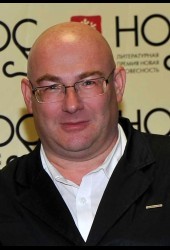 Mark Lipovetsky (New York City, United States) is Professor of Slavic Languages at Columbia University. His research interests include such subjects as post-Soviet culture, Russian postmodernism, post-Soviet drama, late Soviet nonconformist culture, tricksters in Soviet culture. Lipovetsky edited 5-volumes of Dmitry Prigov’s collected works and currently is working on his critical biography. Lipovetsky’s works were nominated for Russian Little Booker Prize (1997) and short-listed for the Andrey Bely Prize (2008). In 2014, Lipovetsky received an award of the American Association of Teachers of Slavic and East European Languages for the outstanding contribution to scholarship. In 2019, Lipovetsky has been awarded the Andrei Belyi Prize for his service to Russian literature. A History of Russian Literature (Oxford, 2018) that Lipovetsky co-authored, received the Honorable Mention from the MLA Aldo and Jeanne Scaglione Prize for Studies in Slavic Languages and Literatures.
Mark Lipovetsky (New York City, United States) is Professor of Slavic Languages at Columbia University. His research interests include such subjects as post-Soviet culture, Russian postmodernism, post-Soviet drama, late Soviet nonconformist culture, tricksters in Soviet culture. Lipovetsky edited 5-volumes of Dmitry Prigov’s collected works and currently is working on his critical biography. Lipovetsky’s works were nominated for Russian Little Booker Prize (1997) and short-listed for the Andrey Bely Prize (2008). In 2014, Lipovetsky received an award of the American Association of Teachers of Slavic and East European Languages for the outstanding contribution to scholarship. In 2019, Lipovetsky has been awarded the Andrei Belyi Prize for his service to Russian literature. A History of Russian Literature (Oxford, 2018) that Lipovetsky co-authored, received the Honorable Mention from the MLA Aldo and Jeanne Scaglione Prize for Studies in Slavic Languages and Literatures.
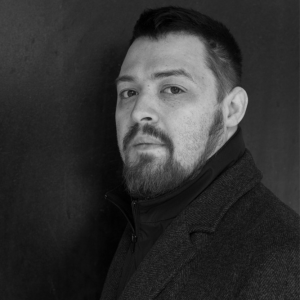 Lev Oborin (Udelnaya (Moscow region), Russia) is a poet, translator, and literary critic. He authored five books of poetry and a children’s book. His poems and articles have been published in various outlets in Russia and abroad, such as Poetry, Poem, Harriman Magazine, International Poetry Review, Novy Mir, Znamia, Vozdukh, Colta.ru, and Горький». He works as an editor for Polka, a website dedicated to Russian literature, and edits a nonfiction series on everyday culture at the New Literary Observer. Oborin has translated several books, including David Remnick’s Lenin’s Tomb and he has translated poetry by Robert Frost, Denise Duhamel, Charles Simic, John Ashbery, Yumlembam Ibomcha Singh, Czesław Miłosz, Tadeusz Różewicz, Justyna Bargielska, and others. Oborin is a winner of Andrei Bely Prize for his criticism (2021), the Parabola Prize for young authors (2019), and the Znamya magazine’s literary award (2010). He has participated in many literary festivals and activities in Russia and other countries, including the United States, the United Kingdom, Poland, Ukraine, and Latvia.
Lev Oborin (Udelnaya (Moscow region), Russia) is a poet, translator, and literary critic. He authored five books of poetry and a children’s book. His poems and articles have been published in various outlets in Russia and abroad, such as Poetry, Poem, Harriman Magazine, International Poetry Review, Novy Mir, Znamia, Vozdukh, Colta.ru, and Горький». He works as an editor for Polka, a website dedicated to Russian literature, and edits a nonfiction series on everyday culture at the New Literary Observer. Oborin has translated several books, including David Remnick’s Lenin’s Tomb and he has translated poetry by Robert Frost, Denise Duhamel, Charles Simic, John Ashbery, Yumlembam Ibomcha Singh, Czesław Miłosz, Tadeusz Różewicz, Justyna Bargielska, and others. Oborin is a winner of Andrei Bely Prize for his criticism (2021), the Parabola Prize for young authors (2019), and the Znamya magazine’s literary award (2010). He has participated in many literary festivals and activities in Russia and other countries, including the United States, the United Kingdom, Poland, Ukraine, and Latvia.
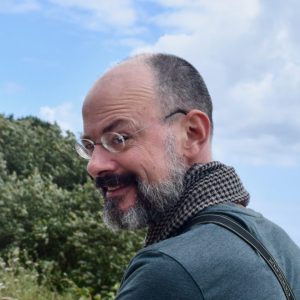 Kevin M. F. Platt (Philadelphia, United States) is a professor of Russian and East European studies at the University of Pennsylvania, where he directs the periodic Russian-American poetry translation symposium “Your Language, My Ear.” His scholarly work focuses on Russian poetry, culture, and history. His translations of Russian poetry have appeared in World Literature Today, Jacket2, n+1, Fence, and other journals. He is the author or editor of several scholarly books, the most recent of which is Global Russian Cultures (University of Wisconsin Press). He was editor and lead translator for Hit Parade (Ugly Duckling Presse), a collection of contemporary poetry by the Latvia-based Orbita Group.
Kevin M. F. Platt (Philadelphia, United States) is a professor of Russian and East European studies at the University of Pennsylvania, where he directs the periodic Russian-American poetry translation symposium “Your Language, My Ear.” His scholarly work focuses on Russian poetry, culture, and history. His translations of Russian poetry have appeared in World Literature Today, Jacket2, n+1, Fence, and other journals. He is the author or editor of several scholarly books, the most recent of which is Global Russian Cultures (University of Wisconsin Press). He was editor and lead translator for Hit Parade (Ugly Duckling Presse), a collection of contemporary poetry by the Latvia-based Orbita Group.
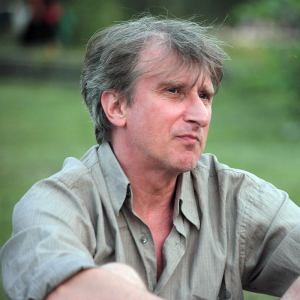 Alexander Skidan (St. Petersburg, Russia) was born in Leningrad in 1965. He is a poet, critic, essayist, and translator. He is also the author of more than 10 books. including the collection of verses Contamination (2020) and the book Lit.ra: selected FB notes (2013-2020). He has translated contemporary American poetry and prose, as well as theoretical works on literature and art. He was the winner of the 2006 Andrei Bely Prize, and a recipient of the 2018 Joseph Brodsky Fellowship Fund. His poetry has been translated into multiple languages and included in several anthologies. In 2008, Ugly Duckling Presse released his bilingual book Red Shifting, and in 2020, it released his essay “Golem Soveticus: Prigov as Brecht and Warhol in One Persona.” He is a member of the working group “What is to be done?”. He is also the editor of the “Practice” section of the New Literary Review. He lives in Saint Petersburg.
Alexander Skidan (St. Petersburg, Russia) was born in Leningrad in 1965. He is a poet, critic, essayist, and translator. He is also the author of more than 10 books. including the collection of verses Contamination (2020) and the book Lit.ra: selected FB notes (2013-2020). He has translated contemporary American poetry and prose, as well as theoretical works on literature and art. He was the winner of the 2006 Andrei Bely Prize, and a recipient of the 2018 Joseph Brodsky Fellowship Fund. His poetry has been translated into multiple languages and included in several anthologies. In 2008, Ugly Duckling Presse released his bilingual book Red Shifting, and in 2020, it released his essay “Golem Soveticus: Prigov as Brecht and Warhol in One Persona.” He is a member of the working group “What is to be done?”. He is also the editor of the “Practice” section of the New Literary Review. He lives in Saint Petersburg.
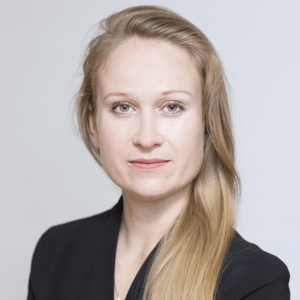 Polina Sadovskaya, Ph.D., (Tbilisi, Georgia) joined the PEN America team in 2016 as the first Free Expression Programs coordinator for Eurasia. She came to New York from Paris, where she was with UNESCO’s Division of Freedom of Expression and Media Development. She organized various international and global forums, and managed a project empowering local communities in Africa with radio and new digital technologies. She is an active supporter of women’s and youth’s rights around the world, and is a member of the IFEX Council. Prior to joining PEN America, Sadovskaya worked for Habitat Pro Association, an NGO advocating for the rights of indigenous peoples in Peru, particularly those of indigenous women and youth. She was also a radio correspondent for a national radio, and a marketing and communications manager with a major bank in her native Russia. She is fluent in Russian, French, and English, and has degrees in marketing from Grenoble Graduate School of Business and in journalism from South Ural State University.
Polina Sadovskaya, Ph.D., (Tbilisi, Georgia) joined the PEN America team in 2016 as the first Free Expression Programs coordinator for Eurasia. She came to New York from Paris, where she was with UNESCO’s Division of Freedom of Expression and Media Development. She organized various international and global forums, and managed a project empowering local communities in Africa with radio and new digital technologies. She is an active supporter of women’s and youth’s rights around the world, and is a member of the IFEX Council. Prior to joining PEN America, Sadovskaya worked for Habitat Pro Association, an NGO advocating for the rights of indigenous peoples in Peru, particularly those of indigenous women and youth. She was also a radio correspondent for a national radio, and a marketing and communications manager with a major bank in her native Russia. She is fluent in Russian, French, and English, and has degrees in marketing from Grenoble Graduate School of Business and in journalism from South Ural State University.
PARTNERS
![]()







